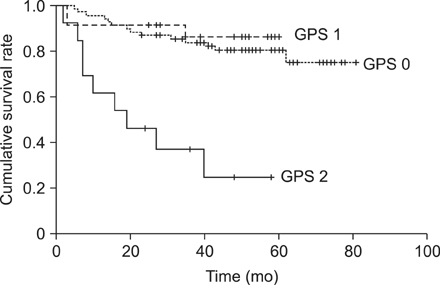Ann Surg Treat Res.
2014 Jun;86(6):309-313. 10.4174/astr.2014.86.6.309.
Inflammation-based score (Glasgow prognostic score) as an independent prognostic factor in colorectal cancer patients
- Affiliations
-
- 1Department of Surgery, Inje University Seoul Paik Hospital, Seoul, Korea. hongsw@paik.ac.kr
- KMID: 2167108
- DOI: http://doi.org/10.4174/astr.2014.86.6.309
Abstract
- PURPOSE
This study was conducted to evaluate the systemic inflammatory response in colorectal cancer patients, and to estimate the usefulness of the Glasgow prognostic score (GPS) as a prognostic factor.
METHODS
Patients with biopsy-proven colorectal adenocarcinoma who were operated between April 2005 and December 2008 were enrolled in this study. The GPS was estimated based on the measurement of CRP and serum albumin level. The GPS was compared with other clinicopathological factors. Univariate and multivariate analyses were performed to evaluate the factors affecting cancer-specific survival.
RESULTS
GPS was significantly higher in patients with anemia, thrombocytosis, a high neutrophil to lymphocyte ratio, tumor of the colon, and large tumor. Patient age, gender, serum CEA level, tumor gross appearance, TNM stage, and tumor differentiation were not related with the GPS. In univariate analysis, hemoglobin, CEA, gross appearance of tumor, TNM stage, tumor differentiation, and GPS were associated with cancer-specific survival. In multivariate analysis, TNM stage (III or IV : I or II; hazard ratio [HR], 12.322; P = 0.015), tumor differentiation (poorly differentiated : well or moderately differentiated; HR, 3.112; P = 0.021), and GPS (GPS 2 : GPS 0 or 1; HR, 5.168; P = 0.003) were identified as independent prognostic factors in colorectal cancer.
CONCLUSION
Our study showed that the GPS was an independent variable from tumor stage and a good and convenient prognostic factor in colorectal cancer patients.
Keyword
MeSH Terms
Figure
Reference
-
1. Trinchieri G. Cancer and inflammation: an old intuition with rapidly evolving new concepts. Annu Rev Immunol. 2012; 30:677–706.2. Mantovani A, Allavena P, Sica A, Balkwill F. Cancer-related inflammation. Nature. 2008; 454:436–444.3. Triantafillidis JK, Nasioulas G, Kosmidis PA. Colorectal cancer and inflammatory bowel disease: epidemiology, risk factors, mechanisms of carcinogenesis and prevention strategies. Anticancer Res. 2009; 29:2727–2737.4. Rostom A, Dube C, Lewin G, Tsertsvadze A, Barrowman N, Code C, et al. Nonsteroidal anti-inflammatory drugs and cyclooxygenase-2 inhibitors for primary prevention of colorectal cancer: a systematic review prepared for the U.S. Preventive Services Task Force. Ann Intern Med. 2007; 146:376–389.5. Gunter MJ, Stolzenberg-Solomon R, Cross AJ, Leitzmann MF, Weinstein S, Wood RJ, et al. A prospective study of serum C-reactive protein and colorectal cancer risk in men. Cancer Res. 2006; 66:2483–2487.6. Roxburgh CS, McMillan DC. Role of systemic inflammatory response in predicting survival in patients with primary operable cancer. Future Oncol. 2010; 6:149–163.7. Forrest LM, McMillan DC, McArdle CS, Angerson WJ, Dunlop DJ. Evaluation of cumulative prognostic scores based on the systemic inflammatory response in patients with inoperable non-small-cell lung cancer. Br J Cancer. 2003; 89:1028–1030.8. Borrello MG, Alberti L, Fischer A, Degl'innocenti D, Ferrario C, Gariboldi M, et al. Induction of a proinflammatory program in normal human thyrocytes by the RET/PTC1 oncogene. Proc Natl Acad Sci U S A. 2005; 102:14825–14830.9. Deans C, Wigmore SJ. Systemic inflammation, cachexia and prognosis in patients with cancer. Curr Opin Clin Nutr Metab Care. 2005; 8:265–269.10. Terzic J, Grivennikov S, Karin E, Karin M. Inflammation and colon cancer. Gastroenterology. 2010; 138:2101–2114.e5.11. McMillan DC, Crozier JE, Canna K, Angerson WJ, McArdle CS. Evaluation of an inflammation-based prognostic score (GPS) in patients undergoing resection for colon and rectal cancer. Int J Colorectal Dis. 2007; 22:881–886.12. Gabay C, Kushner I. Acute-phase proteins and other systemic responses to inflammation. N Engl J Med. 1999; 340:448–454.13. McMillan DC, Watson WS, O'Gorman P, Preston T, Scott HR, McArdle CS. Albumin concentrations are primarily determined by the body cell mass and the systemic inflammatory response in cancer patients with weight loss. Nutr Cancer. 2001; 39:210–213.14. McMillan DC. The systemic inflammation-based Glasgow prognostic score: a decade of experience in patients with cancer. Cancer Treat Rev. 2013; 39:534–540.15. Walsh SR, Cook EJ, Goulder F, Justin TA, Keeling NJ. Neutrophil-lymphocyte ratio as a prognostic factor in colorectal cancer. J Surg Oncol. 2005; 91:181–184.16. Shiu YC, Lin JK, Huang CJ, Jiang JK, Wang LW, Huang HC, et al. Is C-reactive protein a prognostic factor of colorectal cancer? Dis Colon Rectum. 2008; 51:443–449.17. Ishizuka M, Nagata H, Takagi K, Horie T, Kubota K. Inflammation-based prognostic score is a novel predictor of postoperative outcome in patients with colorectal cancer. Ann Surg. 2007; 246:1047–1051.18. Mohri Y, Tanaka K, Ohi M, Toiyama Y, Yasuda H, Inoue Y, et al. Inflammation-based prognostic score as a predictor of postoperative gastric cancer recurrence. Anticancer Res. 2012; 32:4581–4584.19. Ishizuka M, Kubota K, Kita J, Shimoda M, Kato M, Sawada T. Impact of an inflammation-based prognostic system on patients undergoing surgery for hepatocellular carcinoma: a retrospective study of 398 Japanese patients. Am J Surg. 2012; 203:101–106.20. Bastiaannet E, Sampieri K, Dekkers OM, de Craen AJ, van Herk-Sukel MP, Lemmens V, et al. Use of aspirin postdiagnosis improves survival for colon cancer patients. Br J Cancer. 2012; 106:1564–1570.
- Full Text Links
- Actions
-
Cited
- CITED
-
- Close
- Share
- Similar articles
-
- Inflammatory Response Markers as Predictors of Colorectal Cancer Prognosis
- Comparison of inflammation-based prognostic scores as predictors of survival outcomes in patients with germ cell tumors
- C-reactive protein/albumin ratio as prognostic score in oral squamous cell carcinoma
- APACHE III Score as a Prognostic Parameter in Acute Pancreatitis
- Prognostic Factors Associated with Surgical Mortality Conferred by Emergency Operation in Colorectal Cancer


